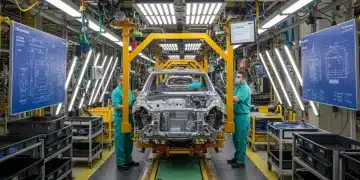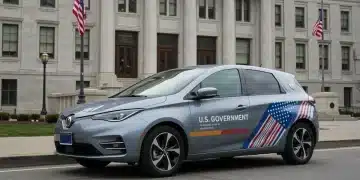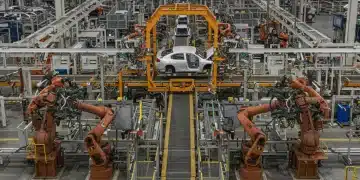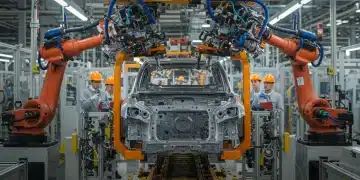2025 Outlook: US Auto Industry’s Sustainable Manufacturing Push
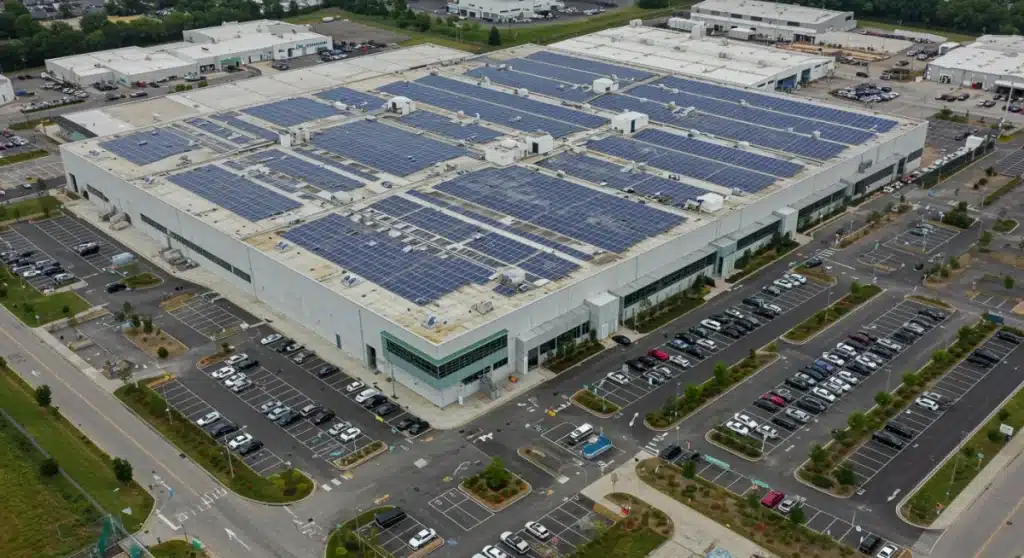
The 2025 Outlook: US Auto Industry’s Push for Sustainable Manufacturing Practices (RECENT UPDATES) reveals a critical shift towards eco-friendly production, driven by evolving regulations, consumer demand, and technological advancements across the sector.
US Auto Sustainable Manufacturing is shaping today’s agenda with new details emerging from industry leaders and policymakers regarding the 2025 outlook. This update prioritizes what changed, why it matters, and what to watch next, in a clear news format for the American automotive market.
The Evolving Landscape of US Auto Sustainable Manufacturing
The US auto industry is rapidly transforming its manufacturing processes to meet aggressive sustainability targets by 2025. This shift is not merely an environmental imperative but a strategic business move, driven by escalating consumer demand for eco-friendly vehicles and increasingly strict regulatory frameworks. Companies are investing heavily in new technologies and operational changes to reduce their carbon footprint, minimize waste, and ensure ethical sourcing of materials.
As the industry moves forward, the focus extends beyond just the vehicles themselves to the entire production lifecycle. This involves everything from the energy sources used in factories to the end-of-life recycling programs for components. The pressure to innovate is constant, with every major automaker outlining ambitious plans for more sustainable operations. This commitment is reshaping supply chains, manufacturing techniques, and even corporate governance across the sector.
Key Drivers for Sustainable Practices
- Regulatory Pressures: New federal and state regulations, including stricter emissions standards and mandates for increased EV production, are compelling automakers to adopt greener practices.
- Consumer Demand: A growing segment of car buyers prioritizes sustainability, influencing purchasing decisions and pushing manufacturers to offer more environmentally responsible products.
- Technological Advancements: Innovations in renewable energy, advanced materials, and recycling technologies make sustainable manufacturing more feasible and cost-effective than ever before.
The commitment to sustainable manufacturing is a multi-faceted challenge, requiring collaboration across the entire automotive ecosystem. From raw material suppliers to dealerships, each link in the chain is being scrutinized for its environmental impact, with a clear trend towards greater transparency and accountability.
Electric Vehicle Production: A Cornerstone of Sustainability
The surge in electric vehicle (EV) production is undeniably the most significant factor driving sustainable manufacturing practices in the US auto industry. Automakers are not only increasing their EV model lineups but are also retooling existing factories and building new ones specifically designed for EV manufacturing. This involves substantial investments in infrastructure, workforce training, and supply chain adjustments to accommodate battery production and other EV-specific components.
The manufacturing of EVs inherently demands more sustainable processes due to the nature of their components, particularly batteries. This includes responsible sourcing of critical minerals, minimizing energy consumption during battery production, and developing robust recycling programs for spent batteries. The long-term vision is a circular economy where materials are reused and repurposed, significantly reducing waste and reliance on virgin resources.
Innovations in EV Manufacturing
- Battery Recycling: Companies are partnering with specialized recyclers to recover valuable materials like lithium, nickel, and cobalt from used EV batteries, reducing the need for new mining.
- Renewable Energy Integration: Many EV production facilities are transitioning to 100% renewable energy sources, such as solar and wind power, to power their operations.
- Lightweight Materials: The use of advanced lightweight materials, like aluminum and carbon fiber, not only improves EV efficiency but also often involves more sustainable production methods.
The push for electric vehicles is transforming the entire auto manufacturing process, forcing a re-evaluation of every step to align with sustainable goals. This includes everything from factory design to the logistics of transporting components, all aimed at minimizing environmental impact.
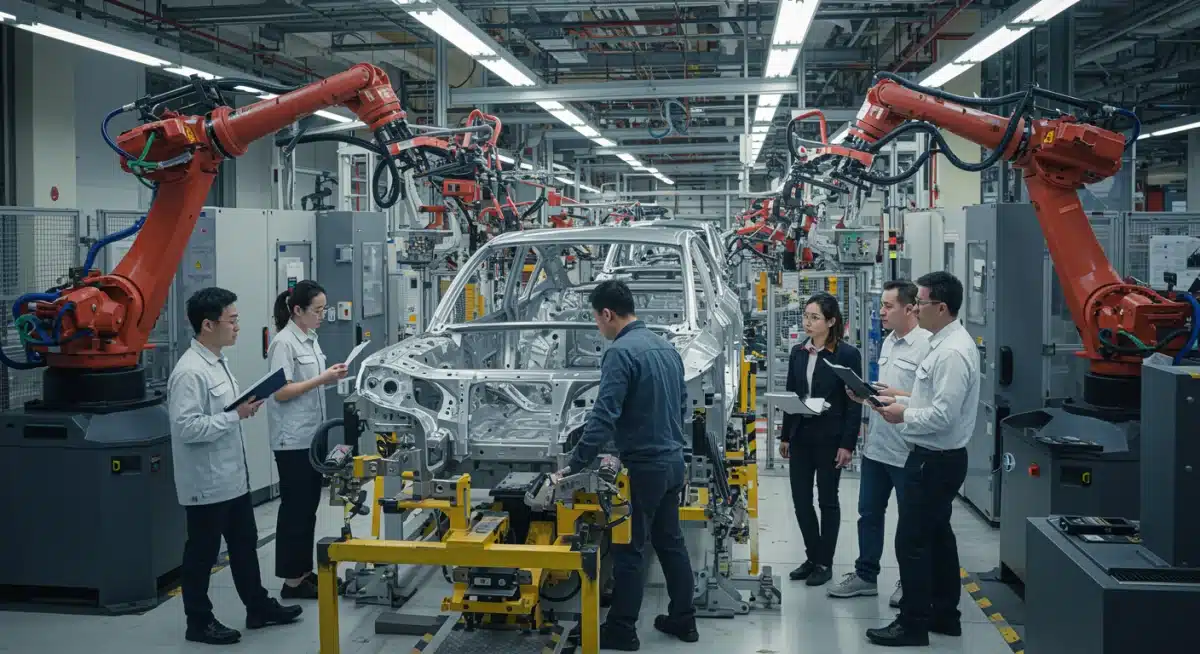
Green Technologies and Energy Efficiency in Factories
Beyond EV production, the broader adoption of green technologies and a relentless focus on energy efficiency are central to the 2025 outlook for US Auto Sustainable Manufacturing. Automakers are implementing a wide array of solutions to reduce energy consumption, minimize water usage, and decrease waste generation across their production facilities. This includes upgrading machinery, optimizing production lines, and investing in advanced monitoring systems to identify and eliminate inefficiencies.
Many factories are now incorporating renewable energy sources directly on-site, such as rooftop solar panels or wind turbines, to power a significant portion of their operations. This not only reduces reliance on fossil fuels but also lowers operational costs, providing a dual benefit. Water conservation efforts are also paramount, with closed-loop systems and advanced filtration technologies becoming standard to reuse water in various manufacturing processes.
The drive for efficiency extends to waste management, where companies are aiming for zero-waste-to-landfill targets. This involves comprehensive recycling programs, repurposing by-products, and collaborating with external partners to find innovative uses for industrial waste. These initiatives are not just about compliance; they are about creating a more resilient and resource-efficient manufacturing ecosystem.
Supply Chain Resilience and Ethical Sourcing
A critical component of sustainable manufacturing is ensuring the resilience and ethical integrity of the supply chain. The US auto industry is increasingly scrutinizing its suppliers, demanding greater transparency regarding their environmental and social practices. This involves evaluating everything from raw material extraction to labor conditions in distant factories. The goal is to build a supply chain that is not only robust against disruptions but also aligns with core sustainability values.
Recent global events have highlighted the vulnerabilities of complex supply chains, prompting automakers to invest in localization and diversification efforts. By sourcing materials and components closer to home, companies can reduce transportation emissions and gain better oversight of supplier practices. This also fosters economic growth within local communities and strengthens regional manufacturing capabilities, contributing to a more sustainable industrial base.
Building a Responsible Supply Chain
- Supplier Audits: Regular and rigorous audits of suppliers to ensure adherence to environmental, social, and governance (ESG) standards.
- Traceability Solutions: Implementing blockchain and other digital tools to track materials from their origin to the final product, ensuring ethical sourcing and transparency.
- Circular Economy Principles: Encouraging suppliers to adopt circular economy principles, such as using recycled content and designing components for recyclability.
The emphasis on supply chain resilience and ethical sourcing is a long-term commitment that requires continuous monitoring and improvement. It is a fundamental aspect of achieving true US Auto Sustainable Manufacturing.
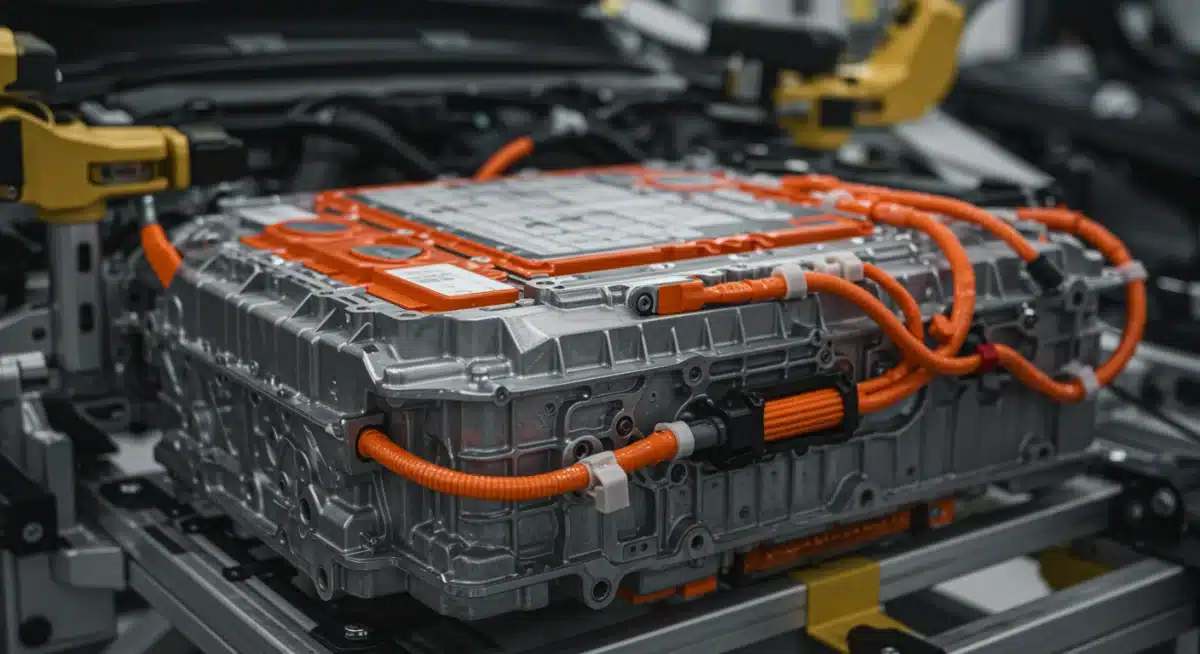
Policy and Collaborative Initiatives Supporting Sustainability
Government policies and collaborative industry initiatives play a pivotal role in accelerating the US auto industry’s transition to sustainable manufacturing. Federal incentives for EV production, renewable energy adoption, and carbon reduction technologies are providing crucial financial support. State-level programs and mandates are also pushing the envelope, creating a competitive environment for innovation in sustainability.
Beyond government action, automakers are increasingly forming partnerships with technology companies, research institutions, and environmental organizations. These collaborations aim to share best practices, develop new sustainable materials, and address complex challenges such as battery recycling and carbon capture. Industry consortia are also emerging to establish common standards and frameworks for sustainable production, ensuring a unified approach across the sector.
The collective effort across government, industry, and academia is creating a powerful ecosystem for sustainable change. This collaborative spirit is essential for overcoming the significant technological and economic hurdles associated with transforming a mature industry like automotive manufacturing. The 2025 outlook clearly shows a path where policy and partnerships drive progress in US Auto Sustainable Manufacturing.
Challenges and Future Outlook for Sustainable Practices
While the momentum towards sustainable manufacturing in the US auto industry is undeniable, significant challenges remain. The high upfront costs associated with retooling factories, investing in new technologies, and overhauling supply chains can be substantial. Additionally, ensuring a consistent supply of ethically sourced critical minerals for EV batteries, such as lithium and cobalt, poses a complex geopolitical and logistical challenge.
Another hurdle is the need for a skilled workforce capable of operating and maintaining advanced green manufacturing processes. This requires significant investment in training and education programs to equip the current and future workforce with the necessary expertise. The development of a robust recycling infrastructure for EV batteries and other complex components is also an ongoing challenge that demands scalable and economically viable solutions.
Despite these challenges, the future outlook for US Auto Sustainable Manufacturing is optimistic. Continued innovation in materials science, energy storage, and AI-driven process optimization will undoubtedly unlock new efficiencies and sustainable solutions. The unwavering commitment from automakers, coupled with supportive government policies and increasing consumer awareness, suggests a trajectory towards a truly circular and environmentally responsible automotive industry for 2025 and beyond.
Key Focus Area |
2025 Outlook > |
|---|---|
EV Production |
Significant increase in EV models and dedicated manufacturing facilities with integrated battery recycling. |
Green Technologies |
Widespread adoption of renewable energy, advanced waste management, and water conservation in factories. |
Supply Chain |
Enhanced transparency, ethical sourcing, and localization efforts to build resilient and responsible networks. |
Policy Support |
Continued government incentives and collaborative industry initiatives driving sustainable innovation and adoption. |
Frequently Asked Questions About Sustainable Auto Manufacturing
The push is driven by a combination of factors including increasingly stringent environmental regulations, growing consumer demand for eco-friendly vehicles, and technological advancements that make sustainable practices more feasible and cost-effective for automakers.
EV production contributes by focusing on responsible sourcing of critical battery minerals, minimizing energy consumption during battery manufacturing, and developing robust recycling programs for spent batteries, aiming for a circular economy approach.
Green technologies are crucial for reducing energy consumption through renewable sources like solar and wind, minimizing water usage with closed-loop systems, and achieving zero-waste-to-landfill targets through comprehensive recycling and repurposing programs in factories.
A resilient and ethical supply chain ensures transparency in material sourcing, reduces environmental impact from transportation, and promotes fair labor practices. Localization and diversification efforts also enhance stability and oversight, contributing to overall sustainability goals.
Challenges include high upfront costs for retooling and new technologies, ensuring a consistent supply of ethically sourced critical minerals, developing a skilled workforce, and creating scalable recycling infrastructure for complex components like EV batteries.
Outlook and Implications
The ongoing transformation within the US auto industry towards sustainable manufacturing practices is not merely a trend but a fundamental recalibration of its operational ethos. This shift signifies a long-term commitment to environmental stewardship and economic resilience. Readers should track upcoming policy announcements, new technological breakthroughs in battery and material science, and the evolving partnerships between industry players, as these will continue to shape the trajectory of a greener automotive future in America.
